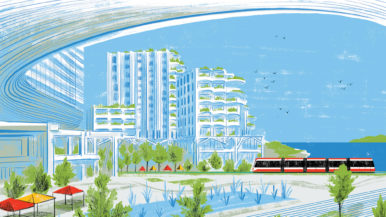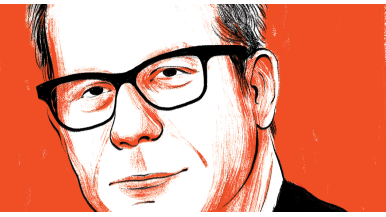A smart city should serve its users, not mine their data

The concept of the “Internet of things” refers to the spread of Internet connectivity to everyday devices: phones, tablets, alarm clocks, cars, thermostats. And in the Internet of things, you—a human being—are a thing. You’re surrounded by sensors that try to infer facts about you, and you’re surrounded by actuators that make things happen to chivvy you along or stop you from proceeding. The intelligence, judgment, self-knowledge and sentiment that are unique to human experience—and impossible to simulate in the statistical inference systems we call “artificial intelligence”—are jettisoned by the system as unquantifiable irrelevancies. The system doesn’t ask you how you feel or what you want: it tries to guess based on what you’re doing.
A smart city of the sort that Sidewalk Labs proposes turns this surveillance-and-inference system into a pervasive straitjacket that wraps around everyone who sets foot on the public street. Indeed, the smart city might even be making observations about you while you’re in your home, from the sensors in your mattress to the sensors in your toilet.
Our cities are necessarily complex, and they benefit from sensing and control. From census tracts to John Snow’s 19th-century map of central London cholera infections, we have been gathering telemetry on the performance of our cities in order to tune and optimize them for hundreds of years. As cities advance, they demand ever-higher degrees of sensing and actuating. But smart cities have to be built by cities themselves, democratically controlled and publicly owned. Reinventing company towns with high-tech fillips is not a path to a brighter future. It’s a new form of digital feudalism.
Humans are excellent sensors. We’re spectacular at deciding what we want for dinner, which seat on the subway we prefer, which restaurants we’re likely to enjoy and which strangers we want to talk to at parties. What if people were the things that smart cities were designed to serve, rather than the data that smart cities lived to process? Here’s how that could work. Imagine someone ripped all the surveillance out of Android and all the anti-user controls out of iOS and left behind nothing on your phone but code that serves you, not manufacturers or advertisers. It could still collect data—where you are, who you talk to, what you say—but it would be a roach motel for that data, which would check in to your device but not check out. It wouldn’t be available to third parties without your ongoing consent.
A phone that knows about you—but doesn’t tell anyone what it knows about you—would be your interface to a better smart city. The city’s systems could stream data to your device, which could pick the relevant elements out of the torrent: the nearest public restroom, whether the next bus has a seat for you, where to get a great sandwich.
To date, most work on customization has focused on centralizing data from people’s activities and making predictions based on that data. The dividends have been poor. The difference between Amazon’s prediction of what’s best for you and Amazon’s generic “what sells best” is thin. Imagine if customization happened at the edges rather than in the middle. Your device could present you with a list of possible things to do and ways to do them without telling anyone else about it, because, frankly, it’s none of their business. You then choose what to do, and your device gathers feedback to help it improve its suggestions in the future. You become the intelligence, acting on your behalf, expressing your unique human ability to comprehend the world.
Such a system would not be nearly so profitable for the companies involved, because it would limit their ability to harvest your personal information, and it would undermine their ability to manipulate your behaviour. This is a feature, not a bug.
This story originally appeared in the September 2019 issue of Toronto Life magazine. To subscribe, for just $29.95 a year, click here.























